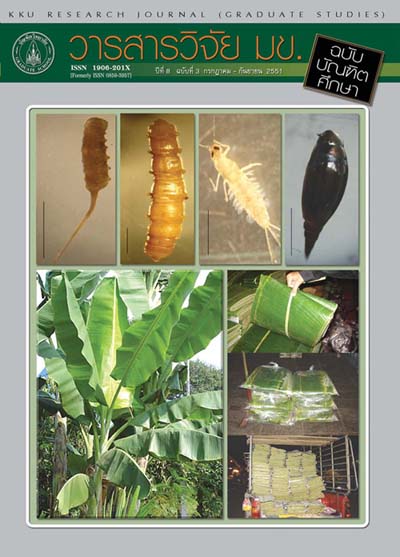Attitude of Estate Townhouse Communities towards Water Saving: A Case Study of Tambon Muang Kao Municipality, Khon Kaen Province(ทัศนคติของชุมชนหมู่บ้านจัดสรรประเภททาวน์เฮ้าส์ต่อการใช้น้ำอย่างประหยัด กรณีศึกษา : เขตเทศบาลตำบลเมืองเก่า จังหวัดขอนแก่น)
Keywords:
Attitude(ทัศนคติ), Water saving(การประหยัดน้ำ), Estate townhouse(ทาว์เฮ้าส์)Abstract
การศึกษาครั้งนี้มีวัตถุประสงค์เพื่อศึกษาทัศนคติและปัจจัยที่มีผลต่อทัศนคติรวมทั้งความคิดเห็นและแนวทางการจัดการน้ำระดับครัวเรือนของชุมชนหมู่บ้านจัดสรรประเภททาวน์เฮ้าส์ กลุ่มตัวอย่างที่ใช้ในการศึกษา คือ ครัวเรือนประเภททาวน์เฮ้าส์ จำนวน 100 ครัวเรือนภายในหมู่บ้านจัดสรร เขตเทศบาลตำบลเมืองเก่า จังหวัดขอนแก่น ดำเนินการศึกษาโดยการใช้แบบสอบถามด้านทัศนคติตามหลักของลิเคอร์ท (Likert Scale) สถิติที่ใช้ในการศึกษา คือ ความถี่ ร้อยละ ค่าเฉลี่ย และการวิเคราะห์ความแปรปรวนทางเดียวของคะแนนเฉลี่ยทัศนคติและเปรียบเทียบค่าเฉลี่ยเป็นรายคู่วิธี LSD ที่ระดับนัยสำคัญ 0.05
ผลการศึกษาพบว่า ทัศนคติต่อการใช้น้ำอย่างประหยัดของชุมชนอยู่ในระดับปานกลาง โดยมีค่าคะแนนทัศนคติเฉลี่ย 3.82 คะแนน และปัจจัยที่มีผลต่อทัศนคติของชุมชนต่อการใช้น้ำอย่างประหยัด คือสถานภาพในครอบครัว ระดับการศึกษา รายได้รวมในครอบครัว และความถี่ในการได้รับข้อมูลข่าวสารเกี่ยวกับการใช้น้ำอย่างประหยัด สำหรับความคิดเห็นเกี่ยวกับการจัดการน้ำในชุมชน พบว่าชุมชนให้ความสำคัญต่อการประหยัดน้ำอยู่ในเกณฑ์ที่ดี โดยร้อยละ 72 มีนโยบายการประหยัดน้ำภายในครัวเรือนของตนเอง ขณะที่ร้อยละ 67 มีการใช้อุปกรณ์ในการประหยัดน้ำภายในครัวเรือน
This study aims to investigate attitudes and factors affecting the attitudes and opinions and methods of water management of the estate townhouse community. One hundred households were sampled from Tambon Muang Kao Municipality, Khon Kaen Province. Collection of attitude data was carried out using questionnaires based on Likert Scale’s concept. Data analysis was conducted by using frequency, percentage and mean, and ANOVA of the attitude scores. Comparison of each pair of means was made by using the LSD method at 0.05 significant levels. The result showed that the attitudes of the communities towards water saving was moderate with the mean score of 3.82, and the factors affecting water saving attitudes were the status in the family, educational level, family income and the frequency of receiving information about water saving. For the opinion of water management in community, it was found that the level of attention for water saving was high. Seventy two percents of the households had their own water saving policy. While, sixty seven percents of the households installed the water saving equipment.



